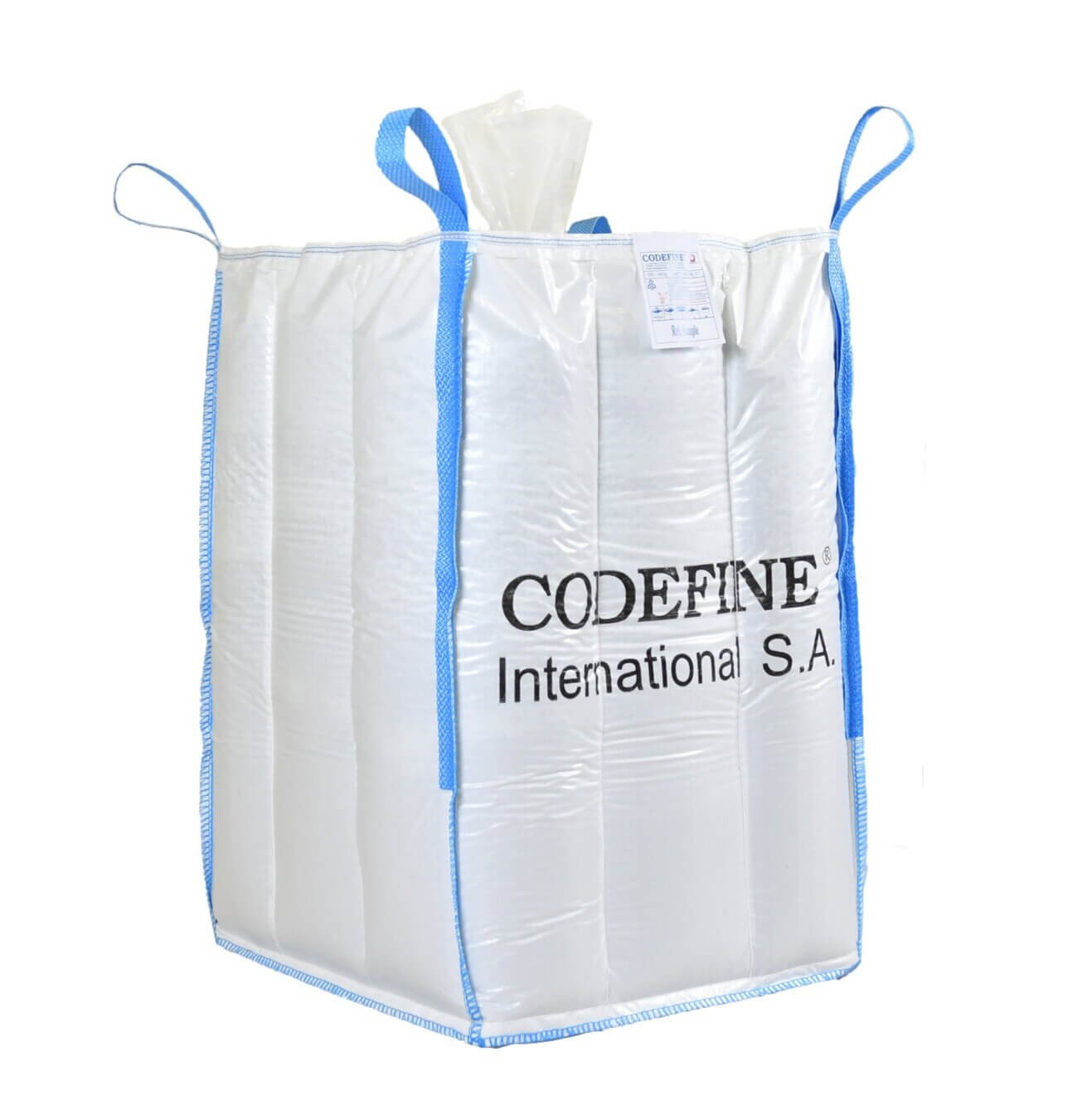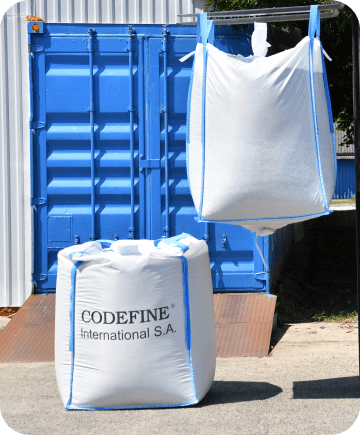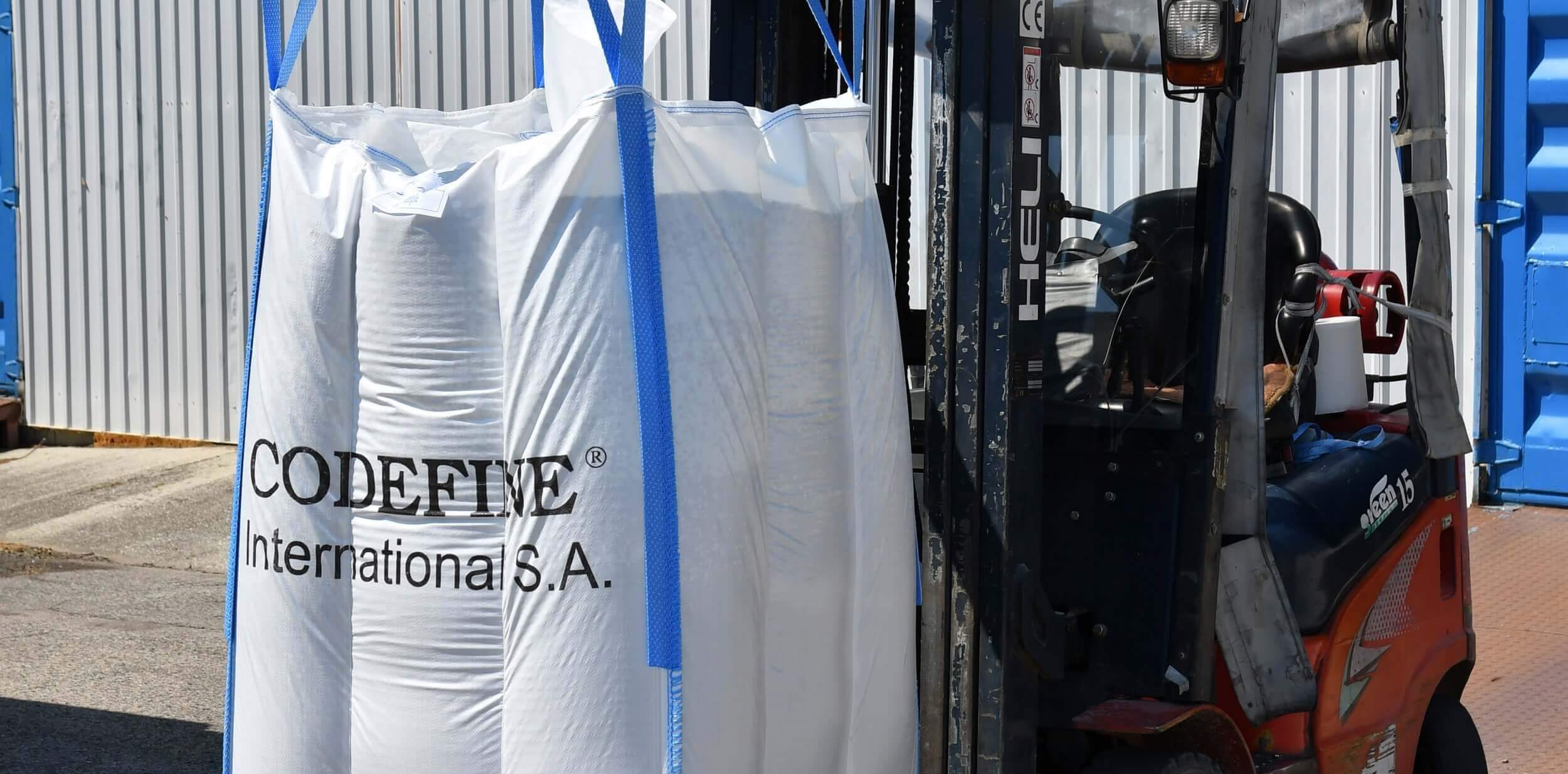Home » Posts Page » Blog » Waterproofing and Outdoor Storage of Bulk Bags

Flexible intermediate bulk containers (FIBCs) are widely used across many different industries. Cost-effective, long-lasting, and incredibly versatile, these bulk containers have endless applications and can be customized to meet exacting requirements. Although they’re a practical choice, one frequently asked question about FIBCs is whether or not they’re waterproof. Looking to learn more about the water-resistant credentials of FIBCs? Thinking about bulk containers for outdoor storage? Read on for everything you need to know.
Although polypropylene itself is waterproof in its non-woven form, woven polypropylene is more permeable. The looser the threads, the less waterproof the material becomes. Many FIBC manufacturers add laminate polymer to polypropylene to compensate for this. While this can go a long way in filling the microscopic spaces between threads, it’s impossible to make the material completely watertight. Furthermore, this process has some downsides. If you’re looking for a breathable FIBC bag, bulk packaging treated with a polymer coating isn’t a good idea.
Different bag closers can also play a part in how watertight or waterproof a FIBC is. Some ton bags come with a drawstring top that can be closed securely once a container is filled. However, they’re not particularly practical. A more functional alternative is a bulk container with a flat top. Once filled, a separate piece of fabric can be placed over the top and held in place with button or snap fastenings.
Although FIBC big bags are not completely waterproof, you may encounter designs being marketed as water-resistant or waterproof bags. Water-resistant bags have usually been treated with a polypropylene coating. Although this coating is invisible to the naked eye, it typically leaves the surface of a bulk bag feeling smoother and gives it a noticeably glossy finish. This coating serves to seal gaps in the woven material, creating a less permeable surface. However, the water-resistant fabric won’t keep every last drop of water out, especially if a bulk bag has been stored outside without a secondary covering.
Ultimately, coating only offers minimal protection against the elements, even if it’s effective at staving off moisture and dust. If you’re looking to keep moisture intrusion to an absolute minimum, it’s best to invest in waterproof FIBC bags. Once again, these container bags aren’t truly waterproof, but they’ll feature several properties that make them more resilient to environmental factors.
FIBCs marketed as waterproof will also have been laminated with a polypropylene layer. In the case of waterproof bags, this film layer should be thicker than what you’ll get from a water-resistant container bag. Sometimes, these designs are sold as non-breathable FIBCs. Even these high-quality bags need a helping hand to lock out moisture. You’ll often find them being sold with additional liners. These liners can be removable, while other bags may come pre-lined.
Owing to their robust construction and versatility, FIBC bags are widely used across many different industry sectors. They’re a popular sight in agricultural settings. FIBCs can be used to store and transport freshly-harvested produce, dramatically extending its shelf life. Just about every type of foodstuff can be stored in a bulk bag, from fine powders and grains to root vegetables. In these cases, breathable bags are best. However, when it comes to storing and hauling livestock feed, bags with water-resistant properties are something to consider.
They’re also a common sight in the food processing sector. Food-grade FIBCs can be used to safely handle processed goods, while fully-loaded bags can be easily stacked and lifted in warehouse settings. What’s more, bulk containers can be readily adapted with different filling and discharging features.
FIBCs are also used in the construction industry. Bulk bags are convenient for storing and transporting construction materials, as well as allowing for safe handling of debris and hazardous materials.
Type C FIBC bags are regularly used in the chemical manufacturing industry. Boasting conductive properties, these bags are suitable for use in potentially dangerous environments where static electricity is a concern. You’ll also encounter bulk containers in the mining industry. Their heavy-duty capacity makes them ideal for hauling bulky ores, minerals, and coal, while their durable construction ensures they’re a cost-effective choice.

Although storing FIBC bags outside isn’t advisable, there are many steps you can take to ensure they’re better protected against the elements. Ideally, you should only be considering outdoor storage if you’re using newer FIBC jumbo bags. The newer your container bag is, the less likely it is to have superficial damage. Furthermore, the woven construction of a newly manufactured bag will be in much better condition than one that’s been used several times before. A fresh coating will also provide added protection against water and the elements.

To bolster protection against water and external factors, it’s also worth investing in a bag liner. These liners provide an extra layer of protection against moisture, helping keep your bulk bags watertight. FIBC bags come in many varieties, but it’s best to choose a design with duffle and spout-style tops. Although these tops won’t make bags waterproof, they’re far more effective at keeping moisture out than open-top designs.
Another way to keep your bag waterproof is to keep it covered with weather-resistant material. An inexpensive tarp can form a reliable barrier against rain and UV rays. Ultimately, however, outdoor storage should be seen as a temporary solution. Ideally, you should be aiming to secure an indoor storage location as soon as possible.